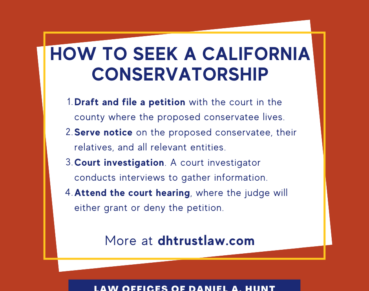A Guide to Conservatorships in California
When a person can no longer provide safe and effective care for themselves, someone else needs to step in to help them. In California, this process is called a conservatorship. In a conservatorship, someone can obtain the legal power and authority to act on behalf of an incapacitated adult. During conservatorship proceedings, a judge will appoint a responsible person to be a conservative for developmentally disabled or infirm adults who cannot take care of themselves.
Who Can be Appointed a Conservator in California?
Conservatorship proceedings begin when someone files a petition for conservatorship with the probate court. Nearly anyone, including the person who needs to be cared for, can file a petition for a conservatorship in California. When deciding who to appoint as a conservator, the court will typically appoint conservatories according to the following order of priority:
- Spouse
- Adult child
- Parent
- Sibling
- Any other interested person, and
- The public guardian
When the person with the highest priority chooses not to act as a conservator, he or she can nominate someone else. When all qualified family members and friends refuse to serve as conservators, the probate court will usually appoint a private, professional fiduciary or a public guardian for the individual. Sometimes people assume that only relatives can act as conservators. On the contrary, the probate court can choose to appoint non-relatives such as government agencies, professional conservators, and nonprofit corporations.
Starting a Conservatorship
The first step in obtaining a conservatorship is to file a petition and all necessary forms with the Superior Court. After filing the petition, the court will typically set up a hearing approximately four weeks after the petition was filed. The court will also notify the proposed conservatee about the petition. The proposed conservatee has a legal right to attend the hearing and oppose the petition with his or her own attorney. An employee of the court called a Court Investigator who would review the proposed conservatorship. The Court Investigator will write a report on the appropriateness of the conservatorship and provide it to the court.
Should the court grant the conservatorship, it will last for a year. The conservatorship requires a new petition every year to continue. In California, courts review limited conservatorship and general conservatives one year from the establishment of the conservatorship and once every two years after that. Typically, there will not need to be another court hearing to renew the conservatorship unless someone requests a hearing. The conservator of the estate must file periodic accountings with the court.
The Legal Responsibilities of a Conservator
A conservator is considered a “fiduciary.” They have a legal, fiduciary duty to act in the conservatee’s best interest. They must act in good faith and with loyalty and concern on behalf of the conservatee. Additionally, the conservator must have the best interest of the conservatee in mind when making decisions. They need to make decisions using the least restrictive environment possible. As much as possible, conservators need to take into account the personal wishes of the conservatee.
The conservator must exercise all of the powers granted to him or her by the court appropriately and not take advantage of the conservatee. When conservatees fail to act reasonably when making decisions while managing the conservatee’s funds, they could face legal liability. In some cases, the conservator’s action will be subject to supervision by the court.
Limited Conservatorships
Limited conservatorships are somewhat similar to regular conservatorships. However, Limited conservatorships only benefit developmentally disabled adults. For example, adults in a limited conservatorship may include adults with severe autism or Down Syndrome. The conservators in a limited conservatorship have limited Authority as most adults with developmental disabilities can make some important life decisions.
Are There Actions a Conservator Cannot Take?
Being appointed as a conservator does not give the conservator the right to do whatever he or she wants regarding the conservatee. For example, a conservator cannot consent to the sterilization of the conservatee unless they have a separate court order. The conservator cannot place the conservatee in a locked mental health facility or state developmental center involuntarily.
They need to have a specific court order authorizing such placement. Additionally, the conservator cannot consent to experimental medication or convulsive therapy for the conservatee. Finally, the conservator does not have control over the wages of the conservatee unless the court has specifically authorized this to happen. Several different financial transactions require specific Court approval before the conservator can make them on behalf of the conservatee.
Proving That a Conservatorship is Necessary
Judges will not approve a conservatorship simply because the proposed conservatee struggles to care for himself or herself. Instead, a judge will only approve a conservatorship when there is strong evidence that the conservatee cannot provide for their own basic needs. In these cases, the conservator is called the conservator of the person. When the proposed conservatee cannot manage his or her financial affairs, the probate court will appoint someone to act as the conservator of the estate. In some cases, one person will act as the conservator of the person and the estate. In other cases, the court will appoint two different people to act as the conservator of the person and the estate.
Contact a Conservatorship Attorney in Sacramento
Are you considering submitting a petition for a conservatorship in California? If so, we recommend discussing your case with a skilled conservatorship attorney. At the Law Office of Daniel Hunt, we have helped many clients in various legal matters related to conservatorships in California. Contact our Sacramento law firm today to schedule your free initial consultation.
Law Offices of Daniel A. Hunt
The Law Offices of Daniel A. Hunt is a California law firm specializing in Estate Planning; Trust Administration & Litigation; Probate; and Conservatorships. We've helped over 10,000 clients find peace of mind. We serve clients throughout the greater Sacramento region and the state of California.




